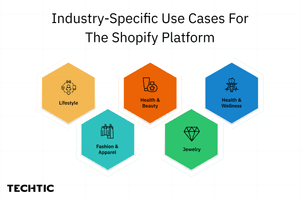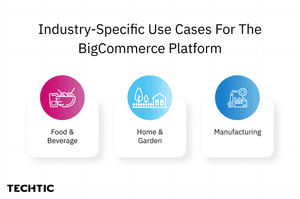Building Flexible eCommerce Solutions: Shopify and BigCommerce with Composable Commerce
Sector: Digital Commerce
Author: Nisarg Mehta
Date Published: 07/26/2024

Contents
Several eCommerce businesses use platforms that restrict them from making changes and scaling up. These platforms offer pre-set interfaces and functions that cannot be easily changed. This inflexibility poses a problem whereby the business needs and customer requirements are always ever-changing.
Additionally, incorporating new technologies and third-party services into such rigid platforms can be quite a challenge and often will take a lot of time. eCommerce businesses are trapped in a particular vendor’s environment.
With the increased expectations for more tailored and flexible eCommerce solutions, both Shopify and BigCommerce have turned to composable commerce as the answer to these demands.
Composable commerce makes it possible for businesses to choose the best-of-breed functionalities and connect them with eCommerce solutions that best suit their needs. This approach differs from the more conventional strategies of monolithic eCommerce systems, which are typically characterized by lower elasticity.
What is Composable Commerce?
Composable commerce is an innovative concept for developing complex, adaptable, and flexible eCommerce solutions. Unlike the traditional monolithic architectures where businesses had to rely on a single, all-encompassing, and inflexible application, composable eCommerce systems are constructed from individual, modular components, each of which represents the best solution for a particular requirement.
In composable commerce, every feature that is involved in a particular process, like payments, customers, or stock is considered a separate component, aka packaged business capabilities (PBC).
What are Packaged Business Capabilities (PBC)
PBCs are business components for application service delivery that are integrative, independent, and deployable. They describe individual business processes like customer management, payment, or recommendation of products and are developed to be plugged into an existing eCommerce environment.
Components of PBCs
- Independently Deployable: All of them can be distributed independently from other subsystems, which makes it possible to enhance various PBCs with improvement and upgrades.
- Business-Oriented: As the case may apply to PBCs originating from the identification of needs that are unique to a business enterprise, they are very relevant and useful in eCommerce.
- Interoperable: It makes them capable of integrating with other PBCs and systems that exist in the integrated eCommerce environment.
Industry-Specific Use Cases of Composable Commerce
Let’s see how composable commerce can help businesses across industries:
For Shopify
Let’s explore industry-specific use cases for the Shopify platform:

Fashion and Apparel
With composable commerce, fashion/ apparel businesses can make product suggestions referencing consumers’ buying habits and tastes. Dynamic inventory management plays an important role in properly tracking inventory and minimizing overstocking or stock-out situations, increasing customer satisfaction and sales.
An example of an application that utilizes AI is when a fashion retailer creates product recommendations and presents customers with an outfit based on the customer’s preferences and past purchases. They can also facilitate the filing of orders and inventory, and thus, provide optimized order management, devoid of overstocking or running out of stock.
Jewelry
Image an online store for jewelry offers an AR experience where the jewelry is placed on the face and body of the buyer. This level of detailed imagery gives the viewer more comprehensive images making the online purchasing even more fulfilling.
To improve customer satisfaction, jewelry brands should use high-quality images and provide virtual ‘apparel’ to help customers visualize products. Here, payment gateways protect customer information, thus making them trust the site and make another purchase again. All of this is possible with composable commerce.
Lifestyle
By applying social media and influencer marketing tools, lifestyle brands can enhance their presence and sales potential online. Offering a smooth checkout process contributes to decreased cart abandonment and improved customer satisfaction, thus increasing sales.
Imagine a lifestyle brand that works with influencers and shares influencers’ blog posts on the site’s product pages, which increases activity. The easily navigable checkout process promotes the continuation of the shopping experience from searching and selecting the products.
Health & Beauty
The use case of composable commerce can be like this: A skincare company on its website has a subscription program where it sells skincare products that have been created based on customer information and details. Through their approach, they also offer an individualized skincare routine based on the mobile app.
Companies in the health and beauty industry may engage in subscription services where customers regularly make their buys and gain customized skin care regimes. Smart and optimized layouts guarantee a seamless buying experience on multiple platforms, more customers, and higher revenues.
Health and Wellness
One of our clients, a fashion retailer, has integrated an AI-driven recommendation engine that provides personalized outfit suggestions based on customer browsing behavior and purchase history. They have also implemented a modular inventory management system that dynamically updates stock levels across multiple sales channels in real-time.
Subsequently, health and wellness brands can be involved in providing customers with consultations and incorporating wellness programs as a way of delivering full service to clients. With features and advantages described in detail, it is easier for a customer to decide in favor of a product and increase confidence in a company.
For BigCommerce
Let’s explore industry-specific use cases for the BigCommerce platform:

Food & Beverage
Grocery and food-selling businesses can track the status of products to meet demands and utilize them in business operations without spoilage.
For instance, a gourmet food delivery service can control the amount of perishable goods and uses real-time inventory tracking. They can also sell subscription boxes and set up the deliveries to be made at the client’s preferred frequency; they regularly can analyze data to know what is preferred and to make improvements.
Home & Garden
The use can be the following: A home decor store deploys an Augmented reality component where customers can realize the appearance of furniture and other decor items at their homes. They also have detailed Do-It-Yourself resources along with solid customer support which can be contacted via various platforms.
Composable Components such as strong customer support help handle inquiries or other related matters, enhancing customer experiences. For the customers, it provides detailed instructions on how to use the product and also can increase customers’ involvement and therefore, their loyalty.
Manufacturing
B2B eCommerce offers manufacturing companies ways of managing operations and serving clients with intermediation for volume and individualized pricing. Effective order handling plays a critical role in guaranteeing delivery of the products on time and the resulting business transactions that enhance business-to-business relationships.
Ending Note
Composable commerce allows for extreme flexibility, extensibility, and the adoption of the best-of-breed solutions that meet business needs perfectly. Such an approach results in improved overall system performance and usage experience and the ability to quickly adapt to new trends and technologies.
If you’re an eCommerce business seeking consultation to upgrade your existing eCommerce store, composable commerce architecture is the best pick you have at this moment. Want to know how you can leverage that? Connect with our eCommerce experts.



